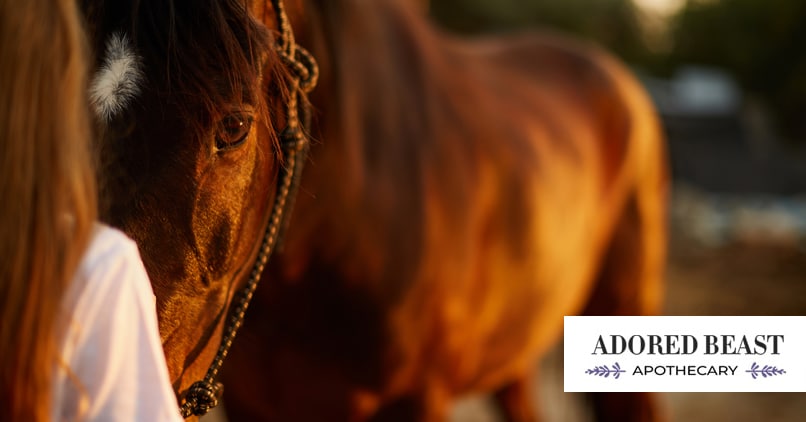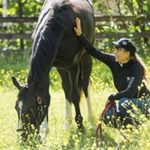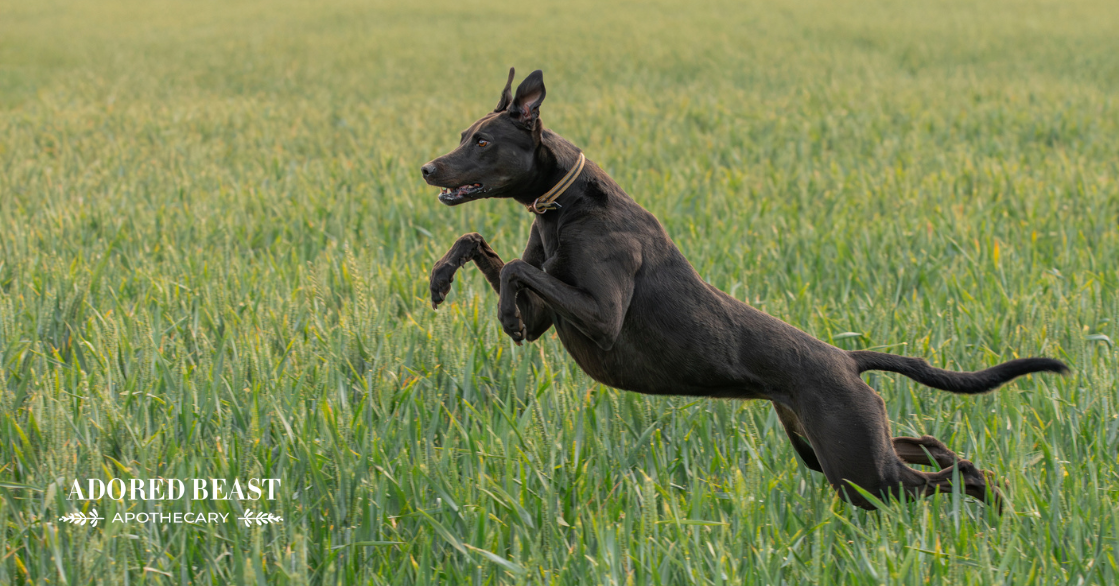Have you ever heard the term “You’re giving me an ulcer”? Basically, it means “you’re stressing me out!” As much as we may joke about it, unfortunately, research shows that stress really does lead to ulcers in horses (1). Gut disease is an epidemic issue among horses. Studies confirm that between 80-90% of performance horses have gastric ulcers (2, 3). There is even a drug that people give to their horses before they go to horse shows to prevent ulcers! How crazy is that?
Horses with ulcers can be symptomatic. It may be hard for them to keep weight on and they may be fussy with food. Other symptoms can include:
- dull coat
- low energy
- diarrhea or dry manure
- gut pain (e.g. grumpy faces when the girth is being tightened)
Or, they can also have little to no symptoms at all. And then they can have sudden and serious digestive issues like colic.
Ulcers are associated with colic, a potentially deadly condition that can affect horses of all ages and backgrounds. I cannot even count the number of people I know who have lost a horse to colic. What’s important to remember is that colic doesn’t “just happen.” It is often associated with pre-existing ulceration of the gut lining. A study of 111 horses published by the Journal of the America Veterinary Association showed that 91 of the 111 horses had gastric ulcers and of those 91 horses, 83% of them were confirmed to have recurrent colic (4). In other words, the gut was severely damaged before the colic occurred!
So what can we do to protect our horses, reduce their stress, heal their gut, and prevent this heartbreaking disease from affecting them?
Understanding The Causes of Gastric Ulcers in Horses
Physical and Mental Stress
Extensive research has been done on ulcers in horses. The consensus is that stress plays a primary role in so many diseases but has been scientifically proven to be a major contributor to ulcers.
So what causes stress for horses? Researchers have identified tangible connections between lack of turnout, lack of social interaction with other horses, sudden changes in routine and housing, horses that are handled by a number of different caregivers and/or riders, horses who go for long periods without eating (more than 6 hours) and those who have diets that do not resemble natural forage (5). The research is overwhelming and undeniable. What this research shows is that the artificial ways that we’ve invented to care for horses, purely out of convenience for ourselves, are stressing them out and damaging them, sometimes to the point of death.
Unnatural housing in small gravel paddocks, lack of movement, social isolation and improper management of access to forage are all factors that contribute to stress and increase risk for ulcers (6).
Muted Social Interaction
The risk of ulcers developing is lower with turnout, especially turnout with others. (6) What this shows is that it’s not just the act of eating that reduces gut disease; it’s also the social interactions that horses need to reduce stress. Animals that cannot express themselves socially through movement, mutual grooming, and just grazing with others are understandably more stressed out. You cannot take away a horse’s social needs and expect them to remain healthy.
Regular Use of Non-Steroidal Anti-Inflammatory Drugs (NSAIDs)
The regular use of NSAID drugs such as phenylbutazone (otherwise known as Bute) and meloxicam has been indicated as a risk factor for equine gastric ulcers (7, 8). There are better ways to reduce inflammation in your horse’s body. One of the main ones is by promoting a healthy gut, not damaging it!
NSAIDs destroy the ulcer-protective mucosal lining of the digestive tract, which is where all the healthy bacteria live. The microbiome is being recognized as a major part of the mammalian immune system. That’s why damage to it can cause immunological chaos. Gut damage can cause inflammation all over the body – in the joints, ligaments, skin, hooves, and almost anywhere else, depending on the individual predisposition of the horse. NSAIDs are not meant for long-term use. Drugs are not the only solution to inflammatory reduction and there are better, non-invasive, preventative measures that you can use to help your horse stay ulcer and inflammation-free. Keep reading!
Grain and Soy in the Diet
Starchy, grain feeds and extruded feeds are high in hydrolysable carbohydrate, which is quickly digested into sugar. Horses are highly sensitive to excess dietary sugar. Given excessive access to grain concentrates that include large amounts of hydrolysable carbohydrate is associated with a number of common equine diseases including (9, 10):
- ulcers
- gastric pH and microbiome imbalance of the cecum and the colon
- insulin resistance
- obesity
- laminitis
- chronic founder
- development of orthopedic disease
- Cushing’s disease
Please do not include grains in your horse’s diet! Horses do not eat large amounts of grain in nature. In fact, they would get very little access to them in their natural environment. There are a number of alternatives that can help improve and maintain your horse’s energy and body condition that are not associated with these diseases.
Soy is another no-no when it comes to equine nutrition. Soy is heavily sprayed with Round-Up (glyphosate), a poisonous pesticide that, when inhaled or ingested, is known to cause ulcers, is indicated in gut disease, neurological diseases and cancer in humans (11). It’s also a completely foreign protein to horses. Stay away from soy.
Preventing Ulcers in Horses and Colic – Going Back to Nature
Preventing gut-related illness in your horse isn’t just important for preventing colic and ulcers. It’s important for avoiding the most common diseases that plague modern day horses. We now know that a lack of movement, unnatural feeding methods, and stress are a brutal combination for horses. So how do we prevent disaster? By creating a life for your horse that is in-line with how their bodies and minds evolved over millions of years. Horses need to move, to forage, have access to species-appropriate food options and social time. It’s simple. Nature has spoken. After all the expensive research studies that have been done, the results show that we simply have to go back to natural ways of caring for our horses.
Mental and Emotional Equine Stress Reduction
Turnout (Forage, Friends, and Dirt!)
Turnout has multiple benefits for horses. It increases low-impact movement, promoting healthy gut motility and blood circulation. This in turn increases nutrition and oxygen to the cells and creates a healthy vascular environment throughout the entire body, including the gut.
Turnout gives horses access to frequent fresh forage (if pastures are properly managed), increasing access to important omega 3 fatty acids. Omegas 3s are known inflammatory modulators, meaning they help reduce inflammation in the body. They are indicated as important dietary nutrients for preventing gut disease (IBS), insulin resistance, and reducing the risk of equine metabolic disease and osteoarthritis (12). Horses need access to good hay and pasture forage in order to get enough omega 3s.
Turnout also allows your horse to behave naturally. Freedom is a major factor in stress reduction. The first thing my horses do is get down on the ground and roll. It’s hard for them to do this comfortably in confined quarters and the ground is much softer for a 1200 lb animal to roll on. The other things my horses do when turned out are go for a little run around and groom each other. They get to express themselves however they wish and interact with field mates at will. And it allows them to forage for their choice of plants and move freely. When I turn them back in, they are always more relaxed and easy to handle. They are content.
Lastly, (and one of the most overlooked factors, in my opinion) is that turnout gives your horse access to DIRT!!!!Thousands of microbes that are necessary for a healthy gut microbiome live in the soil. If your horse doesn’t have a healthy microbial gut culture, they are at risk for gut disease. Microbes in the digestive tract are the cause for fermentation of plant material that allows the horse to absorb important nutrients from those plants. Without them, your horse may develop nutritional deficiency, even if you are feeding the best of everything.
Removing access to soil may even decrease their ability to handle stress. A 2019 study revealed that a soil-derived bacteria called Mycobacterium vaccae produces a novel polyunsaturated fatty acid that reduces immunological and nervous system inflammation and anxiety/fear-related defensive behavioural responses (13). This fat was also recognized for reducing symptoms of inflammatory bowel disease in humans. This is only one bacteria of possibly thousands found in soil that could have positive outcomes for your horse. If we take away their access to dirt, we take away their ability to develop and maintain their gut, their immune system, and even their mental wel-being. This creates a stress/disease feedback loop that can end in disaster. Add processed feeds and grains to the diet and you’ll increase your horse’s risk for microbial/gut/health chaos.
Connecting with Your Horse
If you have a good connection with your horse, they view you as part of their social network. Healthy human/horse social interactions not only reduce their stress, they greatly benefit our mental health too. A good connection can help you assess your horse’s stress load. If you have a horse who’s having recurring health problems, is high strung, hard to handle, or is behaving dangerously under saddle, it may be time to take a close look at your connection with your horse and assess his overall stress levels. This is often best done with the help of a professional horseperson. Getting back to the basics of ground work, calming exercises, and riding with a feel for what’s going on for your horse are important steps in assessing mental and physical stress levels.
Physical Stress Reduction for Ulcer Prevention
Movement
Not only does movement reduce mental stress, it also reduces physical stress. Horses that have access to regular turnout and grazing have significantly reduced risk of ulcers. So along with your training, you must give them access to low-impact movement that comes from grazing. For further information on the benefits of pasture turnout, see my other article: Turn Your Horses Out.
Species-Appropriate Diet
A diet with high quality hay as the base is fundamental for gut health in horses. If you feed grains, turf them and find a high-fibre food source, species-appropriate fat and protein sources, and food-based vitamins and minerals. Non-GMO beet pulp is a good low-sugar fibre source (but you will have to add more nutrition to it) and there are some great whole food horse feeds on the market in the US. (One of my favorites is WildFed. Unfortunately, it’s not available in Canada.) Keep alfalfa to a minimum (and make sure it’s organic) and find high quality (no spray) timothy and/or orchard grass hay. Be sure it has been analysed so you know the quality. If you’re not sure how to analyse your hay, check out my article: Know Your Hay.
Feeding with Frequency
As stated above, horses need to eat at least every 6 hours to avoid ulcer risk. I prefer to feed every 4 hours or less but do what you can. If your horse consumes his hay very quickly, use a slow feeder or a hay net to slow them down to simulate grazing more accurately. Turn them out or hand graze them on well-managed pasture as much as you can.
Omega 3 Fatty Acids
Omega 3 fatty acids are essential in reducing inflammation in all tissues of the body, especially the gut, joints, ligaments, and the nervous system. However, they are lacking in most equine diets. Studies show that the omega 3 alpha-linoleic acid (ALA), found in plants like flax and chia seeds, may not be enough for some horses to keep inflammation in check. It is suggested that horses also have access to 2 other omega 3s called EPA and DHA (14). Horses do have the ability to convert ALA into DHA and EPA, but with so much gut damage occurring in horses, it’s hard to say how much they are absorbing. This may be why they benefit from added EPA and DHA supplementation.
One thing to note is that some horse-care professionals are producing and/or recommending fish oil for horses. This isn’t species-appropriate, environmentally sustainable, or whole-foods based nutrition for horses. It can also be rancid, which is extremely counter-productive for gut health. So turf the fish oil if you are using it. There are better options for horses. I recommend and feed phytoplankton and spirulina, which are environmentally sustainable, plant-based and can be given in small amounts with great benefits. Additionally, they contain a variety of naturally occurring vitamins and minerals.
Pre/Probiotics
In my opinion, all stable-kept horses should be on probiotics. If they aren’t able to access grass and dirt, they need to get their probiotics from somewhere else. Remember, not all probiotics are equal. Make sure you use several (over 10) strains at a time and that you are giving a high quality prebiotic as well (not sugar-based or cellulose-based).
Herbs
Not only do good quality herbs contain vitamins and minerals, they are also fantastic prebiotics. Choosing the right herbs for your horse may require help from an equine herbalist or nutritionist, but some gut-soothing herbs you can start with are aloe vera, peppermint, and chamomile.
L-glutamine
If there is even the remote possibility that you suspect ulcers in your horse, L-glutamine is a must. It’s well recognized for repairing the gut mucosal lining where the good bacteria live. If you’re giving probiotics, L-glutamine should also be included to ensure the bacteria have a home! Ulcers happen when there is a destruction of the mucosal lining and L-glutamine can help to repair it without the side effects of drugs. L-glutamine is found naturally in foods like cabbage, carrots, and Brussels sprouts (and yes, you can feed these to your horse!).
If you’re struggling with your horse’s gut health, I sincerely hope this article can help you get them on the road to recovery. If you need more help, you can contact me through the Adored Beast team at: questions@adoredbeast.com.
Here’s to naturally healthy horses!
References
- Veterinary Medicine (Auckland, New Zealand): Equine glandular gastric disease: prevalence, impact and management strategies (2019)
- Equine Sports Medicine and Surgery – Equine Gastric Ulcer: A Review – Nanna Luthersson, Jenifer A. Nadeau (2013)
- Journal of Equine Veterinary Science – Results of a large-scale necroscopic study of equine colonic ulcers – Pellegrini (2005)
- Journal of the American Veterinary Assopciation: Gastric Ulceration in Horses: 91 cases (1987-1990)
- European College of Equine Internal Medicine Consensus Statement: Equine Gastric Ulcer Syndrome in Adult Horses (2015)
- Journal of Veterinary Internal Medicine: Management factors and clinical implications of glandular and squamous gastric disease in horses (2019)
- Canadian Veterinary Journal: Prevalence of and risk factors for equine glandular and squamous gastric disease in polo horses (2018)
- Journal of Internal Veterinary Medicine: Effects of Meloxicam and Phenylbutazone on equine gastric mucosal permeability (2012)
- Journal of Equine Veterinary Science: Effect of feed processing method on daily gain and gastric ulcer development in weanling horses (2011)
- Middle Tennassee State University: Carbohydrate metabolism and metabolic disease in horses (2009)
- Glyphosate: Pathways to modern diseases 3. Manganese, neurological disease and associated pathologies. (2015)
- Colorado State University Department of Animal Science: Omega 3 fatty acid supplementation in horses (2014)
- John Hopkins University: Identification and characterization of a novel anti-inflammatory lipid isolated from Mycobacterium vaccae, a soil-derived bacterium with immunoregulatory and stress resilience properties (2019)
- The Professional Animal Scientist: Markers of inflammation in arthritic horses fed omega 3 fatty acids (2009)












